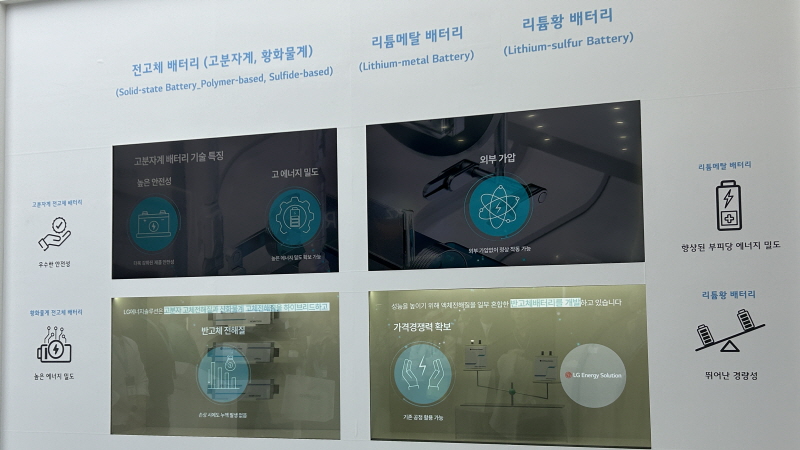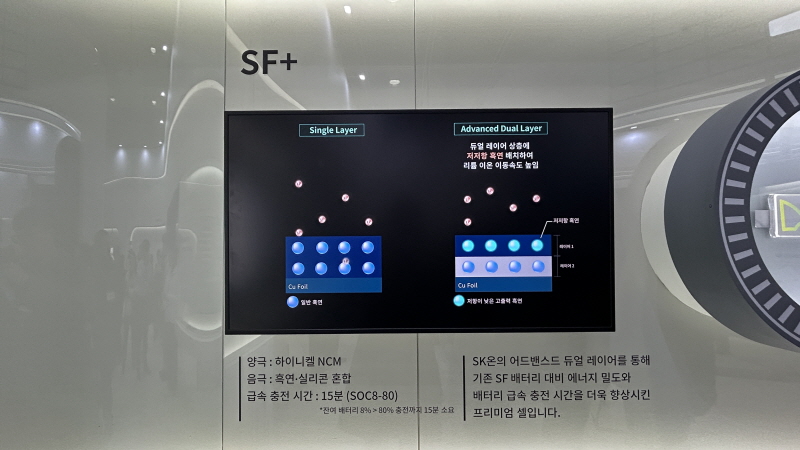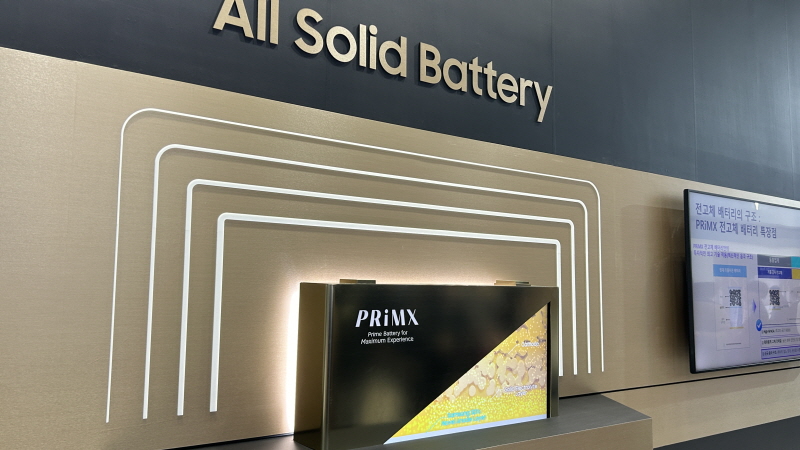LG엔솔, 셀투팩·리튬메탈·반고체 배터리 등 차세대 기술 전시
SK온 SF+ 배터리, 급속충전 시간 18분 → 15분 단축
삼성SDI 전고체 배터리, 신규 음극 구조 통해 사이클 수명 개선
‘인터배터리 2024’에서 보다 더 안전하고, 빨리 충전되고, 더 먼 거리를 주행하기를 바라는 소비자들의 요구를 반영한 차세대 기술과 제품들이 공개됐다.
배터리 3사(LG에너지솔루션, SK ON, 삼성SDI)는 지난 3월 6일부터 8일까지 서울 코엑스에서 개최된 인터배터리 2024에 차세대 배터리 등 다양한 기술과 제품을 선보였다.
배터리 기업들이 보다 더 안전하고, 빨리 충전되고, 더 먼 거리를 주행하기를 바라는 소비자들의 요구를 모두 담은 기술과 제품들을 공개하며 수많은 참관객들을 불러모았다.
이번 인터배터리 2024에는 전세계 18개국, 579개 배터리 업체가 참가했으며 약 12만명의 참관객이 방문하며 역대 최대 규모의 인터배터리 전시회로 기록됐다.
500개사가 참여하고, 10만7,000여명이 참여했던 2023년 인터배터리 행사 보다 훨씬 큰 규모로 개최되었으며, ‘배터리 잡페어’에도 6,000여명이 참석하는 등 동시 개최 행사에도 많은 인파가 몰렸다.
강경성 산업부 1차관은 인터배터리 2024 개막식에서 “정부는 앞으로 LFP 등 보급형 기술 확대 등 글로 벌 흐름에 맞춰 기업 수요를 적극 반영한 R&D 과제들을 추진할 것”이라며 “관계 부처와 협의해 전고체 등 차세대 배터리 개발과 LFP 등 보급형 배터리 개발, 재활용 등 친환경 기술 개발 등을 위해 향후 5년간 총 5,000억원 이상의 R&D를 지원할 것”이라고 발표했다.
■ LG에너지솔루션
LG에너지솔루션(이하 LG엔솔) 부스에서는 셀투팩 기술과 전고체 배터리를 비롯한 다양한 배터리가 눈에 띄었다.
.jpg)
셀투팩(Cell to Pack)은 ‘셀-모듈-팩’ 단계로 제조되던 기존 방식에서 중간 모듈 단계를 생략한 구조로 배터리 팩을 제조하는 기술로 최근 전기차 배터리 시장에서 주목받고 있는 첨단 팩 디자인이다.
LG엔솔은 셀투팩 기술의 △가벼운 무게 △안전 △높은 에너지를 장점으로 내세웠다.
LG엔솔은 파우치 셀의 가벼운 무게 장점을 적극적으로 활용하면서 팩을 구성하는 부품 수도 줄여 더 가볍고 전비가 최적화된 팩을 구현했다.
또한 모듈 구조를 생략함에 따라 팩 안에 더 많은 셀을 탑재해 에너지 밀도를 높여 전기차의 최대 난제인 주행거리도 늘리고 팩 단위 구조의 강성과 열전이 지연 소재를 적용해 안전도 확보하여 화재에 대한 소비자의 우려도 줄였다는 데 큰 이점이 있다.
LG엔솔은 전고체 배터리의 종류인 고분자계 전고체 배터리와 황화물계 전고체 배터리뿐만 아니라 리튬메탈, 리튬황 배터리 등 다양한 형태의 차세대 배터리 연구개발 투자를 이어나가고 있다.

물적 분할 전 2020년 LG화학이 국내 최초로 리튬황 배터리를 탑재한 무인기를 띄워 13시간의 초고고도 비행 테스트에 성공한 바 있다.
LG엔솔은 이를 이어받아 리튬황 배터리를 차세대 배터리 중 가정 먼저 상용화할 예정이며, 2027년 항공 분야 응용을 위한 상용화를 추진하고 있다.
리튬메탈 배터리는 흑연계 음극재를 리튬메탈로 대체한 제품으로 기존 리튬이온 배터리보다 음극재의 무게와 부피를 획기적으로 줄일 수 있다는 특징이 있다.
위와 같은 특징으로 공간 제약이 큰 전기차, 주행형 로봇 등에 사용가치가 높으며, 동일한 공간을사용한다고 가정하면 1.6배의 에너지를 담을 수 있어 주행거리에서도 장점을 가진다.
LG엔솔은 전해질을 고체로 대체해 화재에 대한 안전성이 높고 에너지 밀도가 뛰어나 꿈의 배터리로 불리는 전고체 배터리(고분자계, 황화물계)도 개발 중에 있다.
LG엔솔은 고분자 고체 전해질과 산화물계 고체 전해질을 하이브리드로 사용하고, 성능을 높이기 위해 액체 전해질을 일부 혼합한 반고체배터리를 개발 중이며 안전성을 더 높이기 위해 액체 전해질 비율을 더욱 줄이는 방향으로 연구하고 있다고 전했다.
황화물계 전고체 배터리는 다른 주요 전고체 소재, 고분자나 산화물계 대비 이온의 이동성이 높다는 장점이 있다.
특히 LG엔솔은 배터리 업계 최초로 실리콘 음극재를 적용해 에너지 밀도와 수명을 대폭 향상시켰다.
■ SK ON
SK ON(이하 SK온)은 이번 인터배터리 전시회에 ‘스피드 온’을 주제로 보다 진화된 배터리 급속충전 성능을 비롯 다양한 제품과 기술을 선보였다.
SK온은 기존의 SF배터리(Super Fast, 급속충전) 대비 에너지밀도는 높이면서 급속충전 성능은 유지한 신제품을 공개했다.
SF 배터리는 SK온이 2021년 처음 공개한 하이니켈 배터리로 18분 만에 셀 용량의 10%에서 80%까지 충전할 수 있다.
SK온은 특수 코팅공법을 통해 음극 저항을 획기적으로 낮추고, 음극 정렬 공법을 적용해 리튬이온 이동경로를 단축한 데 이어 배터리 충전 속도를 최대화할 수 있는 분석 기술로 최적화된 급속충전 프로토콜까지 구현하면서 Advanced SF 배터리를 개발했다.
Advanced SF 배터리는 이보다 에너지 밀도는 9% 높이면서 급속충전 시간은 유지했고, 에너지 밀도가 높을수록 많은 에너지를 저장할 수 있어 1회 충전 시 주행거리가 늘어난다.
SK온은 급속충전 시간을 18분에서 15분으로 단축한 SF+ 배터리도 선보였다.

SK온만의 이중 레이어 구조에 고용량 실리콘과 저저항 흑연을 배치해 리튬이온 이동 거리를 줄이고, 이동 속도는 높였다.
저온 성능을 개선한 ‘윈터 프로’(Winter Pro) LFP 배터리도 공개했다.
기존 LFP 배터리는 저온(-20℃)에서 주행거리가 50~70%로 급감하는 반면 윈터 프로 LFP 배터리는 에너지 밀도를 19% 높이고도 저온에서 충전 용량과 방전 용량을 기존 LFP 배터리 대비 각각 약 16%, 10% 늘렸다.
또한 SK온은 부스 내 ‘혁신 기술’ 구역에서 하이니켈 배터리의 양극 활물질 제조 기술인 비수세 공법을 소개했다.
양극 활물질을 만들 때 생기는 잔류 리튬은 배터리 구동 중 불필요한 가스를 발생시키고 표면에 부산물을 생성시켜 양극 성능을 저하시킬 수 있다.
SK온은 독자 기술로 개발한 전용 코팅물질을 통해 물을 사용하지 않는 비수세 공정으로 대체, 양극 성능을 개선했다.
이 공법은 잔류리튬을 양극 활물질을 보호하는 보호층으로 변화시키는데, 이 보호층은 양극에서의 가스 발생을 억제하고 양극 슬러리가 젤로 변화하는 것을 방지한다.
■ 삼성SDI
삼성SDI는 이번 인터배터리 전시회에서 전고체 배터리(All Solid Battery, ASB)의 양산 현황과 로드맵을 처음으로 공개했다.
삼성SDI의 ASB는 현재 양산 중인 각형 배터리(P5)와 비교해 약 40% 향상된 높은 에너지밀도와 안전성을 갖췄다.

삼성SDI의 전고체 배터리 PRiMX ASB는 황화물계 고체 전해질을 사용하며 동종업계의 전고체 배터리와 다르게 리튬 금속 없이 덴드라이트를 제어하는 신규 음극 구조를 통해 사이클 수명을 개선한 것이 큰 특징이다.
삼성SDI는 2023년 상반기 ASB 파일럿 증설을 완료하고 현재 샘플 제작을 완료했고, 2027년 양산화를 진행한다고 밝혔다.
삼성SDI는 지난해 말 신설된 ASB사업화추진팀을 중심으로 SDI연구소 S라인에서 샘플을 생산하는 등 전고체 배터리 사업화를 본격화하고 있으며 독자 조성한 고체 전해질 소재 개선과 혁신적인 무음극 기술을 통해 음극의 부피를 줄여 양극재를 추가함으로써 업계 최고의 에너지 밀도를 달성하겠다는 계획이다.
삼성SDI도 배터리 단자를 위에서 옆으로 옮겨 에너지 효율과 쿨링 시스템을 강화한 새로운 폼팩터의 각형 배터리 및 모듈이 없는 셀투팩 기술을 부스 정면에 내세웠다.
이는 부품 개수를 35% 이상 줄이고, 무게도 20% 줄인 기술로 동일한 부피에서 고에너지 밀도와 혁신적인 비용 절감 구현을 가능하게 한다.
또한 배터리에 화재가 발생하거나 충격이 가해질 경우, 발생할 수 있는 고열과 가스를 벤트(배출구)로 빠르게 배출해 배터리 간의 열 전파를 최소화시키는 열확산 방지 기술과 '인터배터리 2024 어워즈'에서 'ESS 최고 혁신상'을 수상한 주력 ESS 제품인 SBB(Samsung Battery Box)도 선보였다.
.jpg)